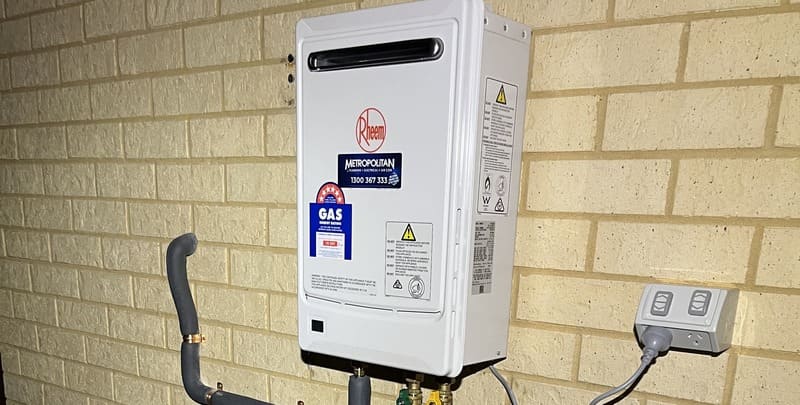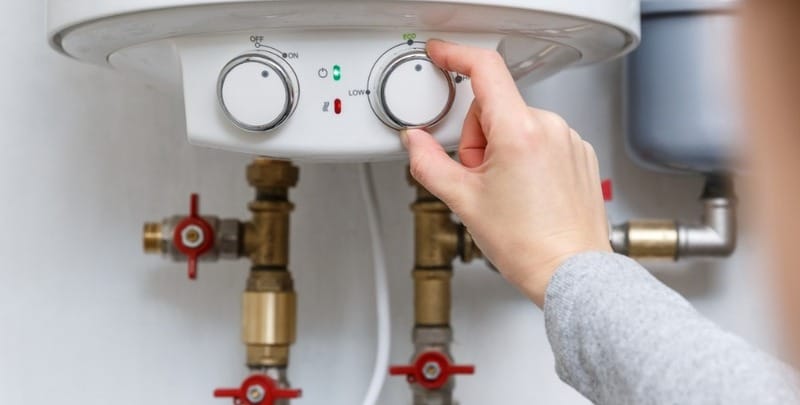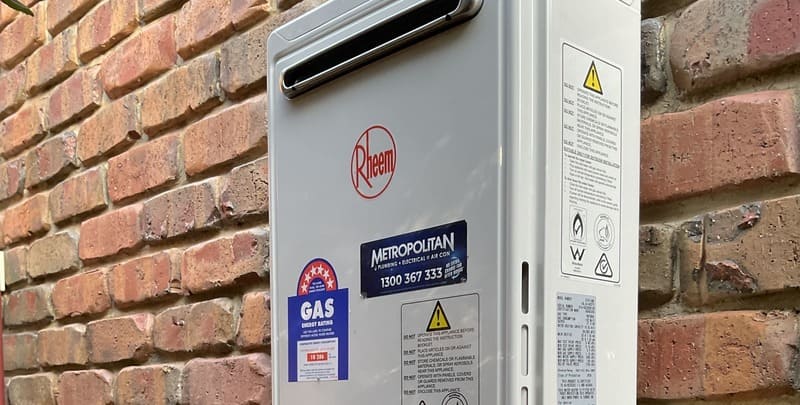
Save Money with a Gas Hot Water System
In the quest for a cost-effective and energy-efficient hot water system, Australian households are increasingly turning their attention to gas hot water systems.
Unlike electric hot water systems, which consume more energy and lead to higher utility bills, gas hot water systems provide a reliable source of hot water, using natural gas to heat water only as needed. This system ensures that energy consumption is kept to a minimum, reducing running costs and the household’s carbon footprint.
Gas hot water units, including storage tank and tankless water heaters, offer greater energy efficiency and a continuous supply of hot water. The use of a gas burner and heat exchanger in these systems allows for instantaneous heating of water to the required temperature, ensuring that there is enough hot water for multiple outlets simultaneously without the need for a large storage tank.
This is particularly advantageous for larger households or during peak times when demand for hot water is high.
Moreover, gas hot water systems stand out for their ability to provide continuous flow and reliable hot water, even on overcast days, unlike some solar hot water systems that might falter in less-than-ideal weather conditions. Their compact size also means they occupy less space, making them ideal for homes with limited space.
The choice between gas and other models like electric hot water heaters or solar hot water systems ultimately depends on the household’s hot water needs, energy efficiency goals, and the desire to lower running costs in the long run.
With the right hot water system, homeowners can ensure a constant supply of hot water, maintain the perfect temperature, and achieve cost savings while being environmentally friendly. Regular maintenance of these systems, whether it involves checking the gas type, ensuring the electric ignition is functioning, or scheduling regular maintenance, further contributes to their efficiency and longevity, making them a smart choice for Australian homes.
Understanding Hot Water Systems
In Australia, the hot water system landscape is diverse, offering a range of solutions to meet the hot water needs of every household. Understanding these options, such as gas hot water systems, solar hot water systems, and tankless water heaters, is essential for choosing the right system that ensures energy efficiency and reliable hot water supply.
Gas hot water systems are popular for their ability to heat water quickly and provide it on demand. These systems use natural gas to heat the water, offering a continuous flow of hot water, which is ideal for households with high hot water needs.
Gas hot water units, especially tankless water heaters, are energy efficient as they only heat up water when a hot water tap is turned on, reducing energy consumption and running costs.
Solar hot water systems harness the power of the sun to heat up water, storing it in large storage tanks. They are highly energy efficient and environmentally friendly, although their performance can be affected by weather conditions. These systems usually come with a gas or electric booster to ensure hot water supply even on overcast days.
Electric hot water systems, which include storage tanks that store and heat water, are common in areas where natural gas is not readily available. While they provide a reliable hot water supply, their energy consumption and running costs can be higher compared to gas and solar options.
Instantaneous systems, or continuous flow hot water systems, heat up water directly as it flows through the unit, ensuring a constant supply of hot water without the need for a storage tank. This system is particularly beneficial for saving space and reducing energy waste, as it heats water on demand.
With such a huge range of hot water systems available, including gas water heaters, solar systems, and tankless models, Australian households can find a solution that meets their specific hot water needs, balances energy efficiency with cost-effectiveness, and fits within the available space and installation constraints.

The Advantages of Gas Hot Water Systems
Gas hot water systems stand out in the Australian market for their efficiency, cost-effectiveness, and ability to provide hot water on demand.
Using natural gas, a readily available and often less expensive energy source, these systems offer significant advantages over other types of hot water systems, such as electric or solar hot water systems.
- Continuous hot water: One of the key benefits of gas hot water systems is their ability to provide continuous hot water. Unlike traditional storage tank systems that can run out of hot water, gas hot water heaters, particularly those with continuous flow or instantaneous technology, heat water as it passes through the unit. This means that hot water is always available, even when there is high demand from multiple hot water outlets in the household. This continuous supply ensures that families never have to endure cold showers, especially during peak times.
- High energy rating: Gas hot water units are known for their high energy rating and efficiency. They only heat up water when a tap is turned on, significantly reducing energy usage and operating costs. This on-demand heating means that no energy is wasted in heating and storing water in a tank, making gas hot water systems more environmentally friendly and cost-effective in the long run.
- Faster heating: Gas hot water systems heat up water faster than their electric counterparts, ensuring that the desired temperature is reached quickly and maintained consistently. This rapid heating capability, combined with the system’s ability to supply hot water to multiple outlets simultaneously, makes gas hot water systems ideal for larger households or homes with significant hot water needs.
- Variety of options: Another advantage is the variety of options available within gas hot water systems, including storage tanks for those who prefer a traditional system, and tankless models for households seeking to save space and reduce energy consumption. The first hour rating, or the amount of hot water the system can deliver in an hour, is often higher in gas systems, meaning they can meet hot water needs more effectively during high usage periods.
- Easy installation: Installation of a gas hot water system is straightforward for qualified technicians, and these systems are generally easier to repair and maintain compared to other models. Their durability and reliability further add to their appeal, making them a preferred choice for new hot water system installations in many Australian homes.
Gas hot water systems offer a compelling mix of continuous hot water supply, energy efficiency, fast heating, and cost savings, making them a superior choice for meeting the diverse and demanding hot water needs of Australian households.
Cost Analysis: Gas vs Electric Hot Water
When considering the long-term financial implications of a hot water system, Australian households often weigh the merits of gas versus electric hot water heaters. A detailed cost analysis of these two main types of systems can provide clarity, helping homeowners make informed decisions based on running cost, energy rating, and installation factors.
Gas hot water systems, especially those with a continuous flow mechanism, typically have a higher initial purchase and cost of install compared to electric hot water units.
However, the running cost of gas systems is often lower, thanks to the efficiency of natural gas as a heating source and the system’s ability to heat up water only when needed. This on-demand heating avoids the energy waste associated with keeping a tank of water hot, as is common in traditional electric storage systems.
Electric hot water systems, on the other hand, tend to have a lower initial cost but can be more expensive to operate in the long term. Although modern electric systems, particularly solar hot water systems with electric backup, can be energy-efficient, the cost of electricity is generally higher than gas, leading to higher running expenses. Electric systems with storage tanks also lose heat over time, requiring more energy to maintain the stored water at the desired temperature.
The energy rating of the hot water system is a critical factor in this cost analysis. Higher energy-rated systems, be they gas or electric, tend to be more efficient and thus less expensive to operate over time. Households should consider the energy rating labels, which indicate how much energy the system uses annually, to estimate the potential operating costs.
Gas hot water heaters, particularly those designed for continuous flow, typically provide a more consistent source of hot water and can handle high demands without running out. This can be particularly beneficial for larger households or those with significant hot water needs, potentially leading to cost savings by avoiding the need to heat a large volume of water in a tank and maintain its temperature.
In terms of installation, gas hot water units might require more extensive plumbing work and the installation of gas lines if they are not already present, which can add to the upfront cost. However, this investment can be recouped over time through lower operating costs.
While gas hot water systems may require a higher initial investment, their lower operating costs and efficient operation can lead to significant savings over the lifespan of the system.
Electric hot water systems, though cheaper to install, may result in higher long-term expenses due to the cost of electricity. Households must consider these factors, along with their hot water usage patterns and needs, to choose the right hot water system.

Choosing the Right Gas Hot Water System
Choosing the right gas hot water system for your home involves several considerations to ensure that it meets your household’s hot water needs efficiently and effectively.
The selection process should factor in the size of the unit, the type of system (continuous flow or storage), energy efficiency, and installation requirements.
Size of the Hot Water Unit
Firstly, consider the size of the gas hot water unit. It should be large enough to meet your household’s peak hot water demand without being so large that it wastes energy. For continuous flow gas water heaters, the flow rate – how much hot water the unit can deliver per minute – is crucial. This rate needs to match your simultaneous hot water outlets usage to ensure a steady source of hot water during peak times.
For households with space to accommodate a tank, a storage-based gas hot water system might be suitable. These systems store water and keep it heated for when it’s needed. The capacity of the tank should align with your daily hot water consumption, factoring in the ‘first hour rating’ which indicates how much hot water the unit can supply in an hour.
Energy Efficiency
Energy efficiency is another critical aspect. Look for a gas hot water heater with a high energy rating, indicating more efficient fuel use and potentially lower operating costs. More efficient systems often have features like electronic ignition, which eliminates the need for a constantly burning pilot light, further reducing gas usage.
Where Is It Being Installed?
Installation considerations are also paramount. The location of the unit, whether it’s outdoors or indoors, and the necessary venting for gas combustion, are key factors. A professional installer can assess your home’s layout and recommend the best installation approach to ensure optimal performance and safety.
Selecting the right gas hot water system requires balancing your household’s hot water demand with the unit’s size, efficiency, and installation specifics. A well-chosen system will provide a constant supply of hot water, be energy efficient, and fit seamlessly into your home’s infrastructure.

Installation and Maintenance
The installation and maintenance of gas hot water systems are crucial for ensuring their efficient operation and longevity in your household. Proper installation sets the foundation for the system’s performance, while regular maintenance keeps it running smoothly and efficiently.
Installation of a gas hot water system should always be conducted by a licensed professional. This ensures that the system complies with local building codes and safety standards, and that it is set up correctly to operate efficiently.
During installation, considerations such as the location of the unit, access to gas and water lines, and proper venting for gas combustion are critical. For continuous hot water systems, the installer will also consider the flow rate and ensure that the system can handle the household’s peak demand for hot water.
Once you install the system, regular maintenance of your gas water heater is essential to prevent issues and extend its lifespan. Maintenance tasks typically include checking and cleaning the burners, inspecting the venting system to ensure it is clear of obstructions, and checking for gas leaks. It’s also important to regularly drain and flush the tank (for storage systems) to remove sediment that can build up and affect the efficiency and heating capability of the unit.
For solar hot water systems with gas boosters, additional maintenance checks on the solar panels and storage tank are necessary to ensure the system’s optimal performance. Regularly checking the cold water supply and ensuring that the solar panels are clean and unobstructed will help maintain the efficiency of the solar heating process.
By adhering to a consistent maintenance schedule, homeowners can ensure their hot water system operates efficiently, reducing the risk of unexpected breakdowns and costly repairs. This proactive approach to maintenance not only extends the life of the system but also ensures that the household has a reliable and consistent source of hot water.
Maximising Efficiency and Reliability
Whether opting for a solar hot water system or a traditional hot water unit, the key to maximising efficiency and reliability lies in choosing the right system for your needs and ensuring professional installation.
By investing in the appropriate hot water solution, households can enjoy consistent and efficient hot water sources. Proper installation and consistent maintenance are crucial to the system’s longevity and performance, helping homeowners save on energy costs and enjoy the comfort of hot water on demand.
Please note: This information is provided for advice purposes only. Regulations differ from state to state, so please consult your local authorities or an industry professional before proceeding with any work. See our Terms & Conditions here.
Published: 2 Apr, 2024